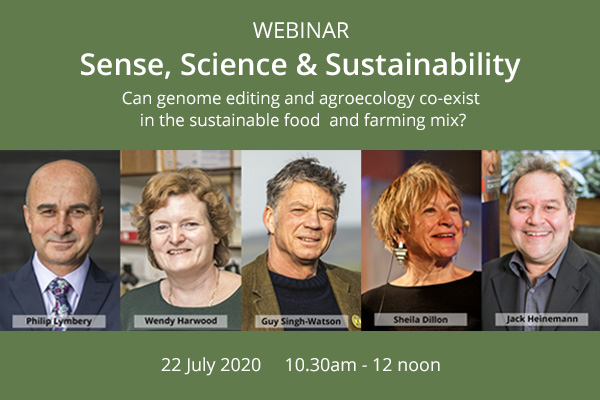CRISPR, TALENS, zinc finger nucleases – these are the new genetic technologies that claim to be the closest to nature yet, and which promise to make farming more sustainable.
They are being hailed as “game-changers” by a surprising variety of people and institutions across business, environment, health and policy worlds. But are these technologies – more formally known as genome editing – really the future of sustainability or are they making promises they might not be able to keep?
Join us on July 22nd at 10.30am GMT for an exclusive webinar where specialists from farming, campaigning, science, business and media will be gathering together for an in-depth discussion of the possibilities and the pitfalls.
The discussion is part of an ongoing collaboration between Beyond GM/A Bigger Conversation and Natural Products Global aimed at exploring the future of natural and organic farming and food. Past panel sessions at Natural Products Europe and the Nordic Organic Food Fair have shown that there is interest, confusion and conflicted loyalties and emotions as natural and organic brands, farmers, growers and the public grapple with what it is going to take to make our food system truly sustainable.
Can genome editing and agroecology co-exist in the sustainable food and farming mix? The UK government thinks it can and as a result is now seriously considering the deregulation of genome edited organisms in agriculture, via the new Agriculture Bill.
What does that mean for organic and natural farmers, businesses and certifiers? For traceability and transparency? Does the promise of crops like genome edited gluten-free wheat, or genome edited animals bred to resist devastating diseases make this technology more acceptable to natural brands and their customers? Crucially, do we all mean the same thing when we say ‘sustainable’?
It promises to be a fascinating discussion and a must for anyone involved in any part of the food chain from farm to table and for all those interested in a sustainable food future.
Audience members will be able to put questions to the panel in a special Q&A session. You can also help to inform the discussion by submitting questions beforehand here.
The webinar is free but you must pre-book your place.
Our Panel
Philip Lymbery is Global Chief Executive of Compassion in World Farming, Visiting Professor at the University of Winchester and President of Eurogroup for Animals, Brussels. He’s an award-winning author, ornithologist, photographer, naturalist and self-confessed animal advocate. His first book Farmaggedon: The True Cost of Cheap Meat was listed as one of The Times Writers Books of the Year.
Wendy Harwood is Head of the Crop Transformation Group at the John Innes Centre, Norwich where she also manages the BRACT Crop Transformation / Genome Editing Platform. Wendy’s expertise includes genetic modification (GM) technologies in a range of crop species and more recently, the development and application of genome editing technologies in crops.
Guy Singh-Watson is a British farmer and founder Riverford, an organic farm and UK-wide organic vegetable box delivery company delivering to around 50,000 customers a week. He is an inspirational, passionate, opinionated and admired figure in the world of organic farming, who still spends more time in the fields than in the boardroom. He regularly lectures on ethical business.
Sheila Dillon is the presenter of Radio 4’s Food Programme, the UK’s longest running and most respected broadcast source of journalism on food and farming. She is an award winning journalist and holds an honorary degree from City University – home of the only department of food policy in the UK – for “changing the way we think about food”.
Jack Heinemann is a professor of genetics and molecular biology in the School of Biological Sciences and Director of the Centre for Integrated Research in Biosafety at the University of Canterbury, New Zealand. He was also one of lead authors of the biotechnology section of 2008’s ground-breaking International Assessment on Agricultural Knowledge, Science and Technology for Development (IAASTD) report.
The session will be chaired by Beyond GM/A Bigger Conversation Director Pat Thomas.

